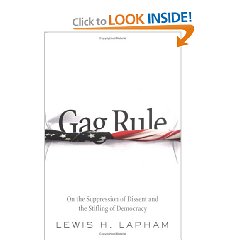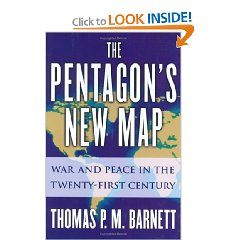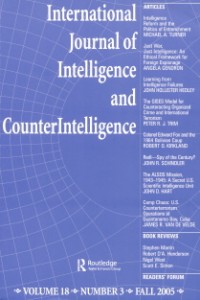Thomas P.M. Barnett
EDITED 8 July 2007 to add rave review of the author's newest incarnation, his presentation given to TED (URL in the comment). He has finally distilled and refined his ideas into a world-class presentation that is a fantastic stage-setter for more substantive and detailed presenations (see second URL in comment). His current (2007) brain is beyond five stars. I am so very pleased to see this brilliant development.
Old Review (Still Valid on the Book Itself)
This is another of those books that started as an article and should have stayed there. The author, who appears to be either unfamiliar with or unwilling to credit works from earlier decades as well as more recently that present ideas similar to and often superior to his, has essentially three good ideas that can be summed up as follows:
Idea #1: World can be divided into a Functioning Core and a Non-Integrating Gap. The disconnected gap is bad for business (risky) and the US military can protect its budget by getting into the business of exporting security so that Wall Street can do more business safely.
Idea #2: Connectivity or disconnectedness are the essential means of defining and influencing which countries are able to move into the Functioning Core and which remain in the Non-Integrating Gap [too state-centric for my taste, but a good point–my 1990's call for Digital Marshal Plan remains valid.]
Idea #3: Economic relationships have replaced military power as the essential attribute of relations among nations–for example, we cannot deal with China as a military power without first having a comprehensive economic strategy and economic tools with which to influence them.
There are many points where I agree with the author, and I give him credit for thinking of all of this on his own, without much attention to decade's worth of scholarship and informed professional opinion in the military journals. He is absolutely correct to note that we cannot fence the Gap, we must stabilize it. Of course, Joe Nye and Max Manwaring and Mark Palmer and Bob Oakley and Jonathan Schell, to name just 5 of the 470+ national security authors have made important points along these lines, but their work is not integrated here. This is one massive Op-Ed that should have remained an article.
The author has irritated me with his low-key but obvious assumption that he is the first to break out of the box and “get it.” On page 63 he goes on at length with the view that America has lacked visionaries, and the implication that he is the first to come forward. Not true. From John Boyd to Chuck Spinney to Bill Lind to GI Wilson to Mike Wylie we have had many visionaries, but the military-industrial complex has always seen them as threats. We tend to dismiss and shoot our visionaries, and I am truly glad that the author's personal relations with Cebrowski and a few others–as well as his fortunate association with a couple of naval think-forward endeavors–has given him some running room.
There is actually little of substance in this book. The article has been expanded, not with substance, but rather with very long descriptions of this young man's engagement in the process of the Pentagon and the process of strategic reflection. His discussions of the many forums that he found boring if not hostile to free thinking are excellent, and that aspect of the book takes it to four stars where it might normally have only received three.
Two weaknesses of the book, perhaps associated with the author's urgent need to “stay inside the wire” in order to keep his job:
1) All his brilliance leads to just two forces being recommended: the “big stick” force and the “baton-stick” (constabulary) force. In fact, were he more familiar with the literature, he would have understood that from diverse points we are all converging on four forces after next: Big War, Small War including White Hat/Police Ops, Peace War, and Cyber-Economic War. Inter-agency strategy, inter-agency budgeting, and inter-agency operations, with a joint inter-agency C4I corps under military direction, are the urgently needed next step.
2) The author is delusional when describing and praising our operational excellence in defeating well-armed enemies. Were he more familiar with the after action reports from Iraq, particularly those done by the Army War College (clearly on a different planet from the Navel War College), he would understand that Iraqi incompetence was the foremost factor in our success, especially when Rumsfeld insisted on throwing out the sequence of force plans and sending us in light and out of balance. He also ignores the vulnerability of complex systems and relies much too heavily on University of Maryland and CIA unclassified publications that are completely out of step with European conflict studies and other arduously collected ground truths about the extent of state and sub-state war and violence.
I disagree with his concluding recommendations that place Africa last on the list of those areas to be saved. His overall recommendations are simplistic, focusing on the standard litany for Pentagon go-alongs: Iraq, Korea, Iran, Colombia, Middle East, China, Asian NATO, Latin American NATO, Africa.
I note with interest his use of the term, “the military-market link.” I believe this refers to an assumption, matured by the author in the course of his Wall Street wargames, and certainly acceptable to the neo-conservatives, to wit, that the U.S. military exists to export security so America can do business. I would draw the reader's attention to Marine Corps General Butler's book, “War as a Racket”, and his strong objection to having spent his career as an “enforcer” for US corporations.
I do want to end with a note of deep sympathy for the author. On the one hand, he overcame a period of time when his sanity was questioned by ignorant Admirals and other “lesser included” Captains of limited intellect. On other he is trapped in a system that does not like iconoclasts but rewards those who innovate on the margins. His book is most useful in describing this environment, where people who rely on secrets are completely out of touch with reality, and service chiefs focus on protecting their budgets rather than accomplishing (or even defining) their mission. He appears to have discovered the Catholic mafia within the naval services, and his several references throughout the book lend weight to my belief that we need to do religious counter-intelligence within the government.











